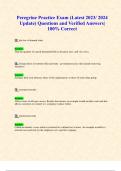Peregrine Practice Exam (Latest 2023/ 2024
Update) Questions and Verified Answers|
100% Correct
Q: the law of demand states
Answer:
That the quantity of a good demanded falls as the price rises, and vice versa.
Q: foreign direct investment (fdi) and trade - government tactics that include removing
incentives
Answer:
Advance their own interests, those of the organization, or those of some other group
Q: external networks
Answer:
Allows users of all types access. Besides the internet, an example would include a network that
allows customers to connect to x company to place orders.
Q: internal networks
Answer:
Called an intranet, is one which is restricted to a defined set of users. An example would be a
network accessed only by the employees of a specific company.
,Q: a suit for negligence must prove four elements: duty of care, breach of duty, proximate cause
and
Answer:
Actual harm
Q: 'liable' means
Answer:
"responsible or answerable in law; legally obligated." legal liability concerns both civil law and
criminal law and can arise from various areas of law, such as contracts, torts, taxes, or fines
given by government agencies. The claimant is the one who seeks to establish, or prove, liability.
Q: tort law elements is a
Answer:
Duty, breach of duty, causation, and injury. In order to claim damages, there must be a breach in
the duty of the defendant towards the plaintiff, which results in an injury. The three main types
of torts are negligence, strict liability (product liability), and intentional torts
Q: financial regulations are
Answer:
A form of regulation or supervision, which subjects financial institutions to certain requirements,
restrictions and guidelines, aiming to maintain the integrity of the financial system. This may be
handled by either a government or non-government organization.
Q: consumer protection
Answer:
Stops unfair, deceptive and fraudulent business practices by collecting complaints and
conducting investigations, suing companies and people that break the law, developing rules to
, maintain a fair marketplace, and educating consumers and businesses about their rights and
responsibilities.
Q: what are the six basic rights
Answer:
The right to be heard, informed, consumer education, courteous service, safety, to choose
Q: title vii of the civil rights act of 1964:
Answer:
This law makes it illegal to discriminate against someone on the basis of race, color, religion,
national origin, or sex. The law also makes it illegal to retaliate against a person because the
person complained about discrimination, filed a charge of discrimination, or participated in an
employment discrimination investigation or lawsuit. The law also requires that employers
reasonably accommodate applicants' and employees' sincerely held religious practices, unless
doing so would impose an undue hardship on the operation of the employer's business.
Q: the pregnancy discrimination act
Answer:
This law amended title vii to make it illegal to discriminate against a woman because of
pregnancy, childbirth, or a medical condition related to pregnancy or childbirth. The law also
makes it illegal to retaliate against a person because the person complained about discrimination,
filed a charge of discrimination, or participated in an employment discrimination investigation or
lawsuit.
Q: the equal pay act of 1963 (epa)
Answer:
This law makes it illegal to pay different wages to men and women if they perform equal work in
the same workplace. The law also makes it illegal to retaliate against a person because the person




